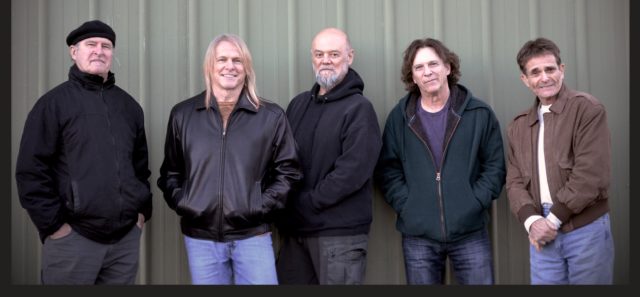
We asked Steve Morse — indisputably one of the planet’s most accomplished guitarists — if there were still parts of his own technique that bedeviled him.
“Picking up on the D string, and down on the G string. I work on that… constantly.”
Not that he goes out of his way to send a message to pedestrian players like us, Morse nonetheless provides a simple gift of wisdom from the heights of guitar mastery.
Practice.
There’s an ethic behind this tiny bit of self-evaluation that speaks to the enduring appeal of Morse’s original band, the Dixie Dregs. Birthed in the mid-1970s from the collaborative restlessness of several University of Miami School of Music students, the Dregs were exactly the right band at the wrong time, cranking complex, genre-hopping and airplay-averse instrumental compositions at a time when the great fusion wave was already starting to recede from industry execs’ business plans, and FM-formatted arena rock was stomping its way across the heartland. Singerless and lacking the jazz-cred big names their fusion predecessors sported, they hung on long enough to gain a deal with Capricorn, with some help from Allman Brothers worthies like Twiggs Lyndon and Chuck Leavell.
The band’s high-octane live shows and rock solid fanbase kept them alive during several record label abandonments, including Capricorns’s own demise in 1979. Lineup changes and brief tours kept the band from dissolving completely, but outside musical pursuits kept the Dixie Dregs (re-named The Dregs for a while in the 1980s) from steady visibility. Morse went on to replace Ritchie Blackmore in Deep Purple, touring and recording with them for two decades. Original violinist Allen Sloane pursued a career in medicine, and drummer Rod Morgenstein spent years with Kip Winger.
But schedules opened up last year, emails and phone calls were exchanged, and to everyone’s mild surprise and relief, the original lineup — Morse, Morgenstein, Sloane, bassist Andy West and keyboardist Steve Davidowski — found themselves rehearsing again.
West — who was, we’re not kidding, riding in the car with Morse as we spoke — says that the vibe came back more or less effortlessly.
“The idea was just to get together and see how it sounded. Amazingly enough, everyone’s personality was exactly intact.”
The early shows on this reunion tour have brought their rewards, both in terms of fan appreciation and a gentle aging of the material itself.
“It’s harder than it used to be,” says Morse, laughing a little.
Notes West, “And we all have the same sense of some of this stuff that… We actually enjoy playing it a little bit slower, the notes are more easily distinguishable, it’s less about being super edgy energy and more about the melodies coming out.”
“When we were stressed out 20-year-olds,” Morse says, “we didn’t realize we were going to grow up to be stressed out 60-year-olds. We played everything too fast.”
Little reported, Morse actually had a guitar stolen several weeks ago, and a few days before our interview, he got an email from an old friend — John McLaughlin — offering to lend him one of his. McLaughlin, of course, set the standard for fusion players and remains the maestro for players who followed in his footsteps, mining disparate musical disciplines and cultural sonorities, overlaying them with dazzlingly, Coltrane-esque technical liberation.
We reminded Morse of a night almost 35 years ago at the Rainbow Music Hall in Denver, when Morse opened with a solo acoustic set for McLaughlin, Paco DeLucia and Al DiMeola. They brought Morse out to join them for the encore, trading solos over a mid-tempo Latin figure. As Morse took his own solo, McLaughlin literally stopped and audibly exclaimed as he leaned over to watch Morse, “Wow.”
“Yes, I remember that tour,” Morse says. “That was a huge part of my life, getting that gig. That made my life right there.”
But the underlying message behind the Dregs’ return may well be, at the risk of oversimplifying, that playing may not be the lost art some suggest it is. It’s a little unfair, maybe, to compare the breathless virtuosity of a Dixie Dregs performance to, say, the highly crafted and tactically produced poise of a Taylor Swift single.
At the same time, you’ve got aging icons like Eric Clapton who recently lamented that perhaps the electric guitar has surrendered its role as the pre-eminent voice of popular music. One of the two great American manufacturers of electric guitars, Gibson, is on financial death watch. Many of the biggest festivals are now headed by producers with mixing boards and Ableton consoles.
Is the electric guitar dead? Or dying?
Unsurprisingly, Morse disagrees.
“Guitar has an element of risk,” Morse notes. “When you see a guy behind a wall of keyboards, and grimacing a little, that’s not the same as looking and seeing the guy’s hands; you can see him miss a note or a note got away from him. But when he hits that note, with just the right tone, you can see that too. There’s that little bit of being involved and seeing the whole thing laid out in front of you.”
Morse says he still practices every day. That’s the ethic. Chasing the ultimate conquest of a simple, six-stringed instrument.
“You’ve got a lifetime of work. If you think you’re going to master it, get back to me when you’re 70 and let me know how you did.”
On the Bill: The Dixie Dregs. 8 p.m. Friday, April 13 and Saturday, April 14, Boulder Theater, 2032 14th St., Boulder. SOLD OUT.














